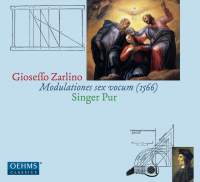Texte paru dans: / Appeared in:

Fanfare Magazine: 37:3 (01-02/2014)
Pour
s'abonner / Subscription information
Les abonnés à Fanfare Magazine ont accès aux archives du
magazine sur internet.
Subscribers to Fanfare Magazine have access to the archives of the magazine
on the net.
Oehms
OC873

Code-barres / Barcode : 4260034868731
Consultez toutes les évaluations recensées pour ce cd
~~~~ Reach all the evaluations located for this CD
Gioseffo Zarlino (1517–1590), a priest, was maestro di cappella at San Marco for the last 25 years of his life, following Adrian Willaert and Cypriano de Rore. A year after arriving at San Marco, he published this book of 13 motets for six voices. These motets are being published this year (2013) in a modern edition by Cristle Collins Judd, the annotator of this disc, along with four motets for four voices published a year later (not recorded here). She also edited the First Book of Motets (1549) a few years ago, from which Michael Noone recorded 12 of the 21 works, again annotated by Judd, the only Zarlino disc on my shelves (Fanfare 32: 1). Before that was a canzona on a “Venice before Monteverdi” set by Michel Corboz (Erato and MHS), hardly a fair representation of his place in that period.
Zarlino’s chief claim to fame, however, is as a theorist, notably his Le istitutioni harmoniche; the 1549 motets illustrated his modal theories, while this set demonstrated his contrapuntal theories, as Judd points out. His theoretical writings use Josquin des Prez and Willaert liberally, and indeed both of his books of motets include a setting of Pater noster—Ave Maria in homage to both composers, who set the paired texts in a similar way. Zarlino refers to this work more than any other in his writings. This is the most interesting work on the disc, for there is a reason why it is the only motet not set for six voices. The two earlier composers set the text for six voices with one of the five notated voices in canon, while Zarlino’s canonic voice, as Judd points out, generates not one but two additional voices. The 1566 version of this motet is a revision of his earlier setting, more than two-thirds of the 254 measures altered in some way for the 1566 publication. The work is placed last in both publications and last on both discs.
While the earlier recording consisted mostly of the motets from the Song of Songs, this disc includes a mix of familiar and unusual liturgical texts. Among the former are the well-known Marian antiphon, the Easter sequence, and Psalm 50, these three coincidentally the longest motets after the Pater noster—Ave Maria. The latter include an antiphon for the blessing of ashes on the first day of Lent, not the most likely occasion for elaborate polyphony, and a passage from Christ’s promise of the Eucharist in John 6 (“Unless you eat the flesh of the Son of Man....”), not familiar in liturgical use. Listening to two these lovely motets raises questions of how they were used.
Although Zarlino is only a few years older than his contemporaries Lassus and Palestrina, his motets are older in style. Singer Pur keeps them moving with elegant balance and tone at tempos that seem just right for music admittedly never heard before. Along with Glossa’s equally fine presentation of Michael Noone’s recording, Zarlino the obscure has certainly arrived.
Cliquez l'un ou l'autre
bouton pour découvrir bien d'autres critiques de CD
Click either button for many other reviews


